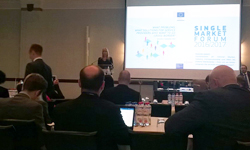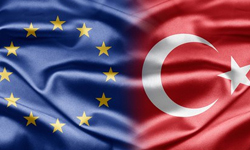BusinessEurope Headlines No. 2016-28
How to deal with an ageing population?
 "The combination of an increasingly ageing population and a shrinking workforce poses huge challenges for our labour markets and social systems. It will place strong pressures on EU growth, public finances and living standards. One overarching means to ensure the EU is able to cope with the challenges associated with population ageing is to increase growth and employment. This is vital to keep age-related public spending relative to GDP on a sustainable path” - underlined Director General of BusinessEurope Markus J. Beyrer during his intervention at the World Demographic & Ageing Forum in St Gallen, Switzerland. Speaking in a panel with the CEO of Economiesuisse Monika Rühl and the DG of the Federation of German Industries (BDI) Markus Kerber he added “there is an urgent need to continue and intensify reforms of pension systems. The European Union should benchmark such reforms to encourage more forceful progress in the coming years. The goal is to ensure a sustainable relationship between levels of contributions, benefits and life expectancy in the Member States. This is essential to provide adequate pensions for future generations and fairness between the generations”.
"The combination of an increasingly ageing population and a shrinking workforce poses huge challenges for our labour markets and social systems. It will place strong pressures on EU growth, public finances and living standards. One overarching means to ensure the EU is able to cope with the challenges associated with population ageing is to increase growth and employment. This is vital to keep age-related public spending relative to GDP on a sustainable path” - underlined Director General of BusinessEurope Markus J. Beyrer during his intervention at the World Demographic & Ageing Forum in St Gallen, Switzerland. Speaking in a panel with the CEO of Economiesuisse Monika Rühl and the DG of the Federation of German Industries (BDI) Markus Kerber he added “there is an urgent need to continue and intensify reforms of pension systems. The European Union should benchmark such reforms to encourage more forceful progress in the coming years. The goal is to ensure a sustainable relationship between levels of contributions, benefits and life expectancy in the Member States. This is essential to provide adequate pensions for future generations and fairness between the generations”.
Contact: Daniele Olivieri
European pillar of social rights: a real chance to increase growth and employment across the EU?
 The European pillar of social rights will only be useful if it really contributes to improving the framework conditions in Europe for job creation and labour market integration. This is the key message of BusinessEurope’s position paper on the pillar, published on 25 August. Speaking at a hearing of the European Parliament Employment Committee on the pillar held on 1 September, BusinessEurope Senior Adviser Rebekah Smith said, ‘as European employers, we recognise the need for increased convergence of the EU and EMU and believe that a genuine and appropriate social dimension can help underpin this. But it has to be about convergence towards the outcomes: restoring competitiveness, growth, employment and social cohesion.’ She went on to say that the way to do this is to develop benchmarks to support national implementation and ownership of structural reforms, as well as revising the flexicurity approach. BusinessEurope is critical of the pillar’s sole focus on social rights: ‘the pillar should better recognise that the social dimension of the EU is much broader than social rights’.
The European pillar of social rights will only be useful if it really contributes to improving the framework conditions in Europe for job creation and labour market integration. This is the key message of BusinessEurope’s position paper on the pillar, published on 25 August. Speaking at a hearing of the European Parliament Employment Committee on the pillar held on 1 September, BusinessEurope Senior Adviser Rebekah Smith said, ‘as European employers, we recognise the need for increased convergence of the EU and EMU and believe that a genuine and appropriate social dimension can help underpin this. But it has to be about convergence towards the outcomes: restoring competitiveness, growth, employment and social cohesion.’ She went on to say that the way to do this is to develop benchmarks to support national implementation and ownership of structural reforms, as well as revising the flexicurity approach. BusinessEurope is critical of the pillar’s sole focus on social rights: ‘the pillar should better recognise that the social dimension of the EU is much broader than social rights’.
Read more or contact: Rebekah Smith
Strengthen the EU economy with more and better cross-border services
 Beyond better implementation of the 2006 Services Directive, Europe needs to focus on new ways to support companies in providing services also across borders. Remaining barriers in the single market often prevent this from happening to the detriment of industry and the EU economy as a whole. The European Commission’s plans to offer companies the possibility to ask for a "services passport" to operate more easily across borders can help, but only if it is well-designed. This was stressed by BusinessEurope Senior Adviser Jeroen Hardenbol at a Commission stakeholder workshop on services on 6 September. The passport will only be a success if it truly saves time and costs for businesses, in particular for SMEs and start-ups. It is important that the passport also leads to regulatory simplification as public authorities become more aware of each other’s procedures and follow best practices. It is crucial that policy-makers listen carefully to relevant stakeholders and companies operating in the construction and business services sectors to ensure that the passport actually meets business needs. Better, more efficient, affordable and customer-focused services are vital to make Europe globally more competitive.
Beyond better implementation of the 2006 Services Directive, Europe needs to focus on new ways to support companies in providing services also across borders. Remaining barriers in the single market often prevent this from happening to the detriment of industry and the EU economy as a whole. The European Commission’s plans to offer companies the possibility to ask for a "services passport" to operate more easily across borders can help, but only if it is well-designed. This was stressed by BusinessEurope Senior Adviser Jeroen Hardenbol at a Commission stakeholder workshop on services on 6 September. The passport will only be a success if it truly saves time and costs for businesses, in particular for SMEs and start-ups. It is important that the passport also leads to regulatory simplification as public authorities become more aware of each other’s procedures and follow best practices. It is crucial that policy-makers listen carefully to relevant stakeholders and companies operating in the construction and business services sectors to ensure that the passport actually meets business needs. Better, more efficient, affordable and customer-focused services are vital to make Europe globally more competitive.
Read more or contact: Jeroen Hardenbol
A fit-for-purpose EU consumer and marketing law framework
 BusinessEurope supports the objectives of the Consumer and Marketing Law Fitness Check. They represent an enormous share of the rules companies need to comply with when conducting their business in the internal market. It is therefore essential to check whether these are still up-to-date and fit for purpose, especially in the light of new business models (e.g. social media, digital content and the collaborative economy). BusinessEurope also welcomes the comprehensive approach taken, looking not only at the relevant directives individually but also as a whole. Stakeholder involvement will be essential during this process in order to deliver better policy outcomes and support accountability. These were the main messages in BusinessEurope’s contribution to the recent European Commission’s consultation on EU consumer and marketing law fitness check.
BusinessEurope supports the objectives of the Consumer and Marketing Law Fitness Check. They represent an enormous share of the rules companies need to comply with when conducting their business in the internal market. It is therefore essential to check whether these are still up-to-date and fit for purpose, especially in the light of new business models (e.g. social media, digital content and the collaborative economy). BusinessEurope also welcomes the comprehensive approach taken, looking not only at the relevant directives individually but also as a whole. Stakeholder involvement will be essential during this process in order to deliver better policy outcomes and support accountability. These were the main messages in BusinessEurope’s contribution to the recent European Commission’s consultation on EU consumer and marketing law fitness check.
Read more or contact: Pedro Oliveira
The EU and Turkey should continue working closely together for an ambitious modernisation of their Customs Union
 “After recent political developments – safeguarding the respect of the rule of law in Turkey is extremely important and businesses, as part of the Civil Society, are very active in this area. In this regard, it is essential that Turkey and the EU maintain a close cooperation, including on the accession process and the modernisation of the EU-Turkey Customs Union Agreement.” said BusinessEurope Director for International Relations, Luisa Santos, during the meeting of the ‘Study Group on the Enhancement of the EU-Turkey bilateral trade relations and the modernisation of the Customs Union’, organised by the European Economic and Social Committee (EESC) on 1 September 2016. For BusinessEurope an up-to-date Customs Union should cover not only trade in goods, but also trade in services, agriculture, public procurement, investments, and competition. It should also take into account the difficulties that currently exist in the implementation of the Agreement and make the necessary improvements, such as establishing a neutral and effective dispute settlement mechanism. Finally, a new Agreement should include provisions that can better link it with the broader EU trade policy and help address current asymmetries, especially related to EU’s Free Trade Agreements.
“After recent political developments – safeguarding the respect of the rule of law in Turkey is extremely important and businesses, as part of the Civil Society, are very active in this area. In this regard, it is essential that Turkey and the EU maintain a close cooperation, including on the accession process and the modernisation of the EU-Turkey Customs Union Agreement.” said BusinessEurope Director for International Relations, Luisa Santos, during the meeting of the ‘Study Group on the Enhancement of the EU-Turkey bilateral trade relations and the modernisation of the Customs Union’, organised by the European Economic and Social Committee (EESC) on 1 September 2016. For BusinessEurope an up-to-date Customs Union should cover not only trade in goods, but also trade in services, agriculture, public procurement, investments, and competition. It should also take into account the difficulties that currently exist in the implementation of the Agreement and make the necessary improvements, such as establishing a neutral and effective dispute settlement mechanism. Finally, a new Agreement should include provisions that can better link it with the broader EU trade policy and help address current asymmetries, especially related to EU’s Free Trade Agreements.
Contact: Sofia Bournou
Enabling future digital networks for growth in Europe
 BusinessEurope sent a letter to Commissioner Gunther Oettinger on 26 August, sharing its views on the future development and importance of future digital networks for the European economy. This comes as the European Commission is expected to publish new rules on Telecommunications including an Action Plan on 5G in mid-September. The letter emphasises that Europe must clearly demonstrate that it wants to achieve a balance between protecting competition and allowing more space for commercial freedom, simplifying regulation and enabling returns on network investment. Together, this can help to achieve growth for all European businesses.
BusinessEurope sent a letter to Commissioner Gunther Oettinger on 26 August, sharing its views on the future development and importance of future digital networks for the European economy. This comes as the European Commission is expected to publish new rules on Telecommunications including an Action Plan on 5G in mid-September. The letter emphasises that Europe must clearly demonstrate that it wants to achieve a balance between protecting competition and allowing more space for commercial freedom, simplifying regulation and enabling returns on network investment. Together, this can help to achieve growth for all European businesses.
Read more or contact: Marco Moragón
European Fund for Strategic Investment is good for business
 Companies welcome the European Fund for Strategic Investment (EFSI). It is an innovative instrument that allows important projects with a higher risk profile to advance, and facilitates access for small and medium sized enterprises to innovation and risk finance. Moving forward, it will be important to communicate further on the EFSI in all member states, and to provide greater support to the countries having more difficulties in mobilising this instrument. A thorough assessment of the outcome of the EFSI so far will be needed in order to make the necessary adjustments, particularly in view of a possible EFSI extension. These were some of BusinessEurope’s messages during a meeting with the EFSI steering board in Luxembourg on 7 September.
Companies welcome the European Fund for Strategic Investment (EFSI). It is an innovative instrument that allows important projects with a higher risk profile to advance, and facilitates access for small and medium sized enterprises to innovation and risk finance. Moving forward, it will be important to communicate further on the EFSI in all member states, and to provide greater support to the countries having more difficulties in mobilising this instrument. A thorough assessment of the outcome of the EFSI so far will be needed in order to make the necessary adjustments, particularly in view of a possible EFSI extension. These were some of BusinessEurope’s messages during a meeting with the EFSI steering board in Luxembourg on 7 September.
Contact: Joana Valente
Broad strategic vision needed for the start-up initiative
 “The European Commission interest in start-ups should trigger accelerated EU policy initiatives for start-ups and growth-oriented small and medium sized enterprises (SMEs) in general,” said BusinessEurope in its response to the European Commission’s consultation on start-ups, 20 July 2016. Start-ups and growth-oriented SMEs face a lot of common challenges. Stronger efforts are needed to improve the framework conditions in which SMEs operate, so as to help SMEs tackling these challenges. Such a policy approach would deliver a substantial double dividend: positive effects both for start-ups and for growth-oriented SMEs. The European Commission is expected to issue a communication proposing policy measures as a follow-up to its consultation towards mid-November.
“The European Commission interest in start-ups should trigger accelerated EU policy initiatives for start-ups and growth-oriented small and medium sized enterprises (SMEs) in general,” said BusinessEurope in its response to the European Commission’s consultation on start-ups, 20 July 2016. Start-ups and growth-oriented SMEs face a lot of common challenges. Stronger efforts are needed to improve the framework conditions in which SMEs operate, so as to help SMEs tackling these challenges. Such a policy approach would deliver a substantial double dividend: positive effects both for start-ups and for growth-oriented SMEs. The European Commission is expected to issue a communication proposing policy measures as a follow-up to its consultation towards mid-November.
Contact: Daniel Cloquet
Calendar
 09 September 2016: Eurogroup
09 September 2016: Eurogroup- 09 September 2016: Informal Meeting of Ministers for Economic and Financial Affairs
- 12 September 2016: Parliament hearing of new UK Commissioner
- 12-15 September 2016: EP plenary in Strasbourg
- 13 September 2016: Informal College meeting
- 14 September 2016: State of the Union speech by President Juncker
- 16 September 2016: EU Council, Bratislava